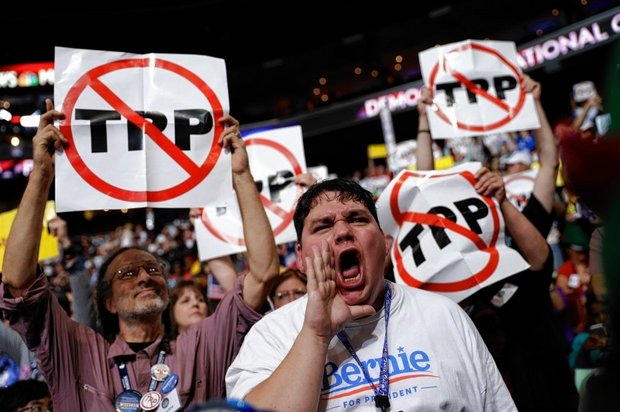Delegates are using the convention to make the TPP politically unacceptable

The Nation | 28 July 2016
Delegates are using the convention to make the TPP politically unacceptable
By John Nichols
Philadelphia—When President Obama looked out across a packed hall at the Democratic National Convention Wednesday night, he could not have missed the large square signs opposing the Trans-Pacific Partnership. They could be seen throughout the sprawling arena. In the Texas delegation and the Oregon delegation, in the Washington delegation and the Wisconsin delegation, delegates waved signs showing the letters “TPP” circled and with a red line slashed through them.
Mid-way through the president’s well-received address to the convention, delegates in a stand directly opposite the stage unfurled a sign that read: “TPP Kills Democracy.” And right up front, wearing his “Stop TPP” T-shirt, stickers and pins, was retired lawyer Stephen Spitz from Falls Church, Virginia.
“I wanted to make sure that he saw that Democrats do not want him to submit the TPP in the lame-duck session of Congress after the election,” said Spitz, the “End Corporate Rule” coordinator for the group Progressive Democrats of America.
Many of the people holding up the anti-TPP signs cheered when the president spoke of addressing inequality and injustice. Some attached their various anti-TPP signs—many of them produced by the National Nurses United union—to blue-and-white signs that read “Obama,” which were distributed by party officials and filled the hall for the president’s address.
The TPP is where the line has been drawn at this convention.
Even before delegates gathered in Philadelphia, platform drafters wrangled over the issue—finally settling on a strongly worded statement declaring that trade agreements “must not undermine democratic decision making through special privileges and private courts for corporations, and trade negotiations must be transparent and inclusive. Democrats’ priority is to significantly strengthen enforcement of existing trade rules and strengthen the tools we have, including by holding countries accountable on currency manipulation and significantly expanding enforcement resources.” Outlining labor, environment and currency-manipulation standards, and calling for “streamlined and effective enforcement mechanisms” that “protect workers and the environment,” the amendment insisted that “These are standards all Democrats believe should be applied to all trade agreements, including the Trans-Pacific Partnership.”
“The Democratic Party’s message has to be ‘No TPP’ and there can’t be any mixed signals.” —Ben Jealous
But there is still speculation that President Obama will seek to gain congressional approval in a lame-duck session following the election.
On the third night of the Democratic National Convention, delegates took every opportunity to discourage lame-duck consideration. During the speeches of Virginia Senator Tim Kaine, the party’s vice-presidential nominee, and President Obama, hundreds of delegates signaled their opposition to the trade deal. Some even took advantage of quiet moments to chant “No TPP.”
Obama has steadily advocated for congressional action on the trade agreement, while Kaine voted for “fast-track” Trade Promotion Authority to advance it. (Since his selection by Hillary Clinton to serve as her running mate, Kaine has adopted an anti-TPP stance. But there is plenty of skepticism regarding his election-season conversion.)
Most congressional Democrats have been steadily opposed to the TPP. Vermont Senator Bernie Sanders made his opposition central to his campaign for the 2016 Democratic presidential nomination, which declared, “The TPP would expand the same failed ‘free trade’ policies to 12 other nations that have already cost millions of jobs and shuttered tens of thousands of factories across the United States. Make no mistake: if TPP passes, it will further hurt consumers and cost American jobs.”
Sanders says, “Holding a vote on the TPP during a ‘lame duck’ session would be going against the will of the people.”
Former secretary of state Hillary Clinton, who once suggested that the TPP could serve as a “gold standard” for future trade deals, became increasingly vocal in expressing opposition as the 2016 campaign progressed. “I oppose the TPP agreement—and that means before and after the election,” Clinton wrote in response to an Oregon Fair Trade coalition survey that was released in May.
Delegates on the floor of the convention pressed the point.
“The Democratic Party’s message has to be ‘No TPP’ and there can’t be any mixed signals, there can’t be a sense that it will suddenly reappear after the election,” says former National Association for the Advancement of Colored People president Ben Jealous, a prominent Sanders supporter who has now endorsed Clinton.
Jealous is blunt about the urgency of delivering an unequivocal anti-TPP message: “The Clinton presidency that we are all trying to make happen will be jeopardized if there is a sense that Democrats are waffling on this issue.”





